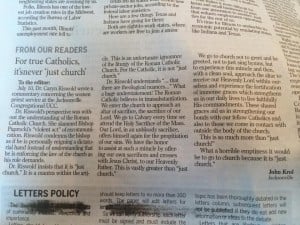I wrote the following commentary which was published last week in my local newspaper, the Jacksonville Journal-Courier, and picked up the following day by the Alton Telegraph. A letter to the editor responding to it appeared this week … see it, along with my reply, below.
 Something new is happening in Jacksonville that is actually quite old. Something radical is going on that is actually pretty ordinary.
Something new is happening in Jacksonville that is actually quite old. Something radical is going on that is actually pretty ordinary.
What is new is Holy Family Inclusive Catholic Community, which held its first mass on June 8 in the sanctuary of the Jacksonville Congregational UCC. It’s leader, Rev. Mary Keldermans, was recently ordained as part of the international Roman Catholic Womanpriests movement, drawing statements of condemnation from Bishop Thomas John Paprocki:
“The Christian faithful are cautioned that this attempted ordination and these purported ‘Masses’ are invalid. Those who knowingly and intentionally participate in these schismatic activities also incur automatic excommunication in accord with canons 751 and 1364, with due regard for canons 1321-1324 of the Code of Canon Law.”
When I attended the mass on June 21, I found myself wondering what church leaders think is happening here that requires the violent act of excommunication.
It’s just church.
It’s people greeting each other and saying hello. It’s prayers for the world and those in need, even prayers for the bishop himself. It’s songs of praise and exercises of liturgical memory. It’s hearing the gospel and the psalms. A sermon about the eucharist with encouragement to contemplate its meaning in daily life. A table open to all, even Lutherans like me who don’t even know all the words. It’s a woman presiding, called by the Holy Spirit and ordained by the community of faith.
It’s just church.
It’s just an experience like so many others happening every day in this town and around the world. It was pretty ordinary; and yet the context is pretty extraordinary.
This community is meeting in a place that has always been the site of boundary-breaking spiritual work for peace and justice. Established in 1833, the Jacksonville Congregational Church was soon thereafter dubbed “the abolition church” for its involvement in anti-slavery activism and support for the underground railroad. It also represented an “ecclesiastical revolution” when it was founded in Jacksonville, the same town as a Presbyterian church. Breaking down established boundaries it seems has long been a part of the Jacksonville UCC story.
And so for this place to welcome this small and feisty band of Catholic Christians to gather and worship in its space isn’t really new. To my Protestant senses, it’s part of the ongoing reformation of the Christian tradition.
And it really isn’t that radical. I found myself wondering what the Bishop thinks is going on that undermines God’s work in the world. It seems to me that it makes space for the spirit that wasn’t there before. It welcomes people who have otherwise been rejected from the sacraments themselves. Who controls the means of grace, anyway?
What this (woman)priest and this community undermines isn’t God’s work in the world. It’s the patriarchal authority of an all-male priesthood. It’s the power of a person, a bishop, to declare who is welcome at God’s table and who isn’t.
I understand that there are theological nuances and traditional commitments that undergird the Roman Catholic Church that are not mine. I see this all as an outsider, a Lutheran theologian whose tradition has been ordaining women for nearly 45 years; a feminist activist committed to challenging patriarchy wherever it deforms and distorts the full humanity of women and men.
But really. It’s just church.
And yes, it’s a just church.
A Response
 It says something that I was relieved that the subsequent letter to the editor taking issue with my characterization of church (see my photo) actually engaged with ideas, and didn’t resort to ad hominem attack against me and/or my employer. Because that’s what often happens. That is what’s currently happening to a colleague of mine who wrote a serious critique of the tea party in his column in the same local paper last week. I don’t want to link to the right-wing websites that are now calling him “crazed,” illogical, and telling all the world to not take classes from him. Instead, read this blog article about him by Illinois College student, Ryan Flynn.
It says something that I was relieved that the subsequent letter to the editor taking issue with my characterization of church (see my photo) actually engaged with ideas, and didn’t resort to ad hominem attack against me and/or my employer. Because that’s what often happens. That is what’s currently happening to a colleague of mine who wrote a serious critique of the tea party in his column in the same local paper last week. I don’t want to link to the right-wing websites that are now calling him “crazed,” illogical, and telling all the world to not take classes from him. Instead, read this blog article about him by Illinois College student, Ryan Flynn.
I’ve gotten that kind of hateful response from writing in public about controversial issues before. Most of us have. A few year ago, Laurie Penny suggested that, for women writers in particular, having an opinion and expressing it in writing “is the short skirt of the internet.” It’s a provocative way to characterize the hatred and personal vitriol that often follows public expression of political and controversial opinions.
Which is why I’m perfectly happy to have a reasoned disagreement with anyone about what church is, and what its purpose is. This is what civil debate looks like.
And this is why Mr. Krol and I don’t go to the same church.












